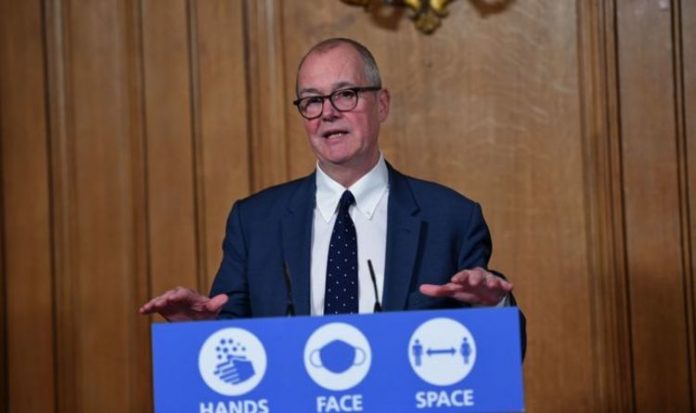Figures published yesterday showed Covid cases were starting to fall among younger people but rising in older, more vulnerable age groups. Officials warned of increasing numbers of older people becoming seriously ill, as the UK announced a further 189 deaths from the disease within 28 days of diagnosis. Meanwhile, some 21,242 daily cases were picked up through testing, up from 18,980 last Thursday.
But Sir Patrick, the UK’s chief scientific adviser, said that in total between 53,000 and 90,000 new infections are thought to be occurring daily, based on expert modelling.
At the Downing Street briefing, he warned that restrictions to control the virus would be needed for some time.
He said: “The numbers speak for themselves. They are increasing and they are not going to decrease quickly.
“A lot depends now on what happens over the next few weeks.
“At the moment, the numbers are heading in the wrong direction but there are some signs in some places of a potential flattening off of that.
“We need to wait and see and monitor the numbers very carefully.”

Chief scientific adviser Sir Patrick Vallance (Image: Eddie Mulholland/Daily Telegraph/PA Wire)
Sir Patrick and the Prime Minister both stressed that the measures in place across the country were having a significant effect.
The R value, which shows how many people the average infected person passes the virus on to, is around half the figure to be expected in an unmitigated epidemic, they said.
Sir Patrick added: “There are some areas where we begin to see real effects of what’s happening.
“There’s some indications that among young people rates are coming down or flattening off a bit, due to the huge efforts that people have made to try to adhere to these changes and behaviours that we need to have in order to get this down.
“And in some areas of the country we can begin to see a little bit of flattening possibly.
“The measures are having an effect but we need to do more if the aim is to get R below one and to shrink the epidemic.”
Public Health England’s latest surveillance report showed infections in England were highest among people in their 20s – at 274.3 cases per 100,000 people in the week to October 18.
This was an improvement on the previous week when there were 300.9 cases per 100,000.
Infections among 10 to 19-yearolds also dropped from 294.4 to 207.7. However, the rate for the 70 to 79 age group was 77.9, up from 64.8, and for people aged 80 and over it was 114.4, up from 88.7.
Hospital admissions have also continued to rise, especially in the NorthWest and in the over-85s.
On Wednesday, 6,018 patients were in hospitals across England, up from 4,156 a week earlier.
And it has now emerged that Nottingham has entered into discussions with the Government over possible Tier 3 restrictions after the region saw a “dramatic increase” in coronavirus patients.
Dr Tristan Cope, the medical director of Liverpool University Hospitals NHS Trust, confirmed its hospitals were treating more coronavirus patients than during the peak of the first wave.
The trust had 398 in-patients with Covid-19, compared to 390 at the height on April 12.
He urged local residents to stick to social distancing rules, as he warned of the “huge strain” Covid-19 was creating.
He wrote on Twitter: “We can all help reduce that pressure by taking some very simple measures – washing our hands frequently, keeping our distance from others from outside our household and wearing face coverings in indoor settings.”

Health Secretary Matt Hancock (Image: PRU/AFP via Getty Images)
Meanwhile Health Secretary Matt Hancock confirmed that Manchester’s Nightingale hospital will reopen to deal with a high number of cases.
The temporary facility, set up in a conference centre, will treat patients in the North-west who are recovering from coronavirus.
Mr Hancock told MPs: “The fight is not over. Cases and hospitalisations and, tragically, deaths are all rising. Across the UK, the number of deaths has doubled in under the fortnight.
“And yet, just as the situation we face is grave, so too is hope of a solution growing. With every day my confidence in the ingenuity of science to bring resolution grows, but until that moment we must have resolve.”
Dr Yvonne Doyle, Medical Director of Public Health England, also warned that the virus continued to have a disproportionate impact on Black, Asian and minority ethnic communities.
Almost four in ten new criticalcare admissions have involved people from these backgrounds over the course of the pandemic.
Dr Doyle said: “This virus continues to have a disproportionate impact on our Black, Asian and minority ethnic communities.
“Hospital admissions and deaths continue to climb right across the country, and there are signs that increasing numbers of older people are now getting seriously ill.”
Meanwhile, the performance of the NHS Test and Trace system continued to decline, with just one in seven people – 15 percent – getting their result back in 24 hours in the week ending October 14.
This was down from 33 percent in the previous week and the lowest weekly percentage since Test and Trace began in May.
Tests counted include those at a regional site, local site or mobile unit – a so-called in-person test.
The proportion of close contacts reached and asked to self-isolate also dropped to less than 60 percent, or six in ten people – the lowest on record.







